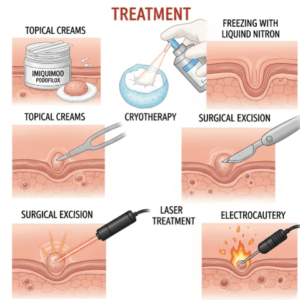Overview
Acute Hepatitis is a sudden inflammation of the liver that develops rapidly and usually lasts less than six months. It can be caused by infections, medications, toxins, or autoimmune conditions. The liver, a vital organ responsible for processing nutrients and detoxifying the body, can become impaired when inflamed, affecting overall health.
Timely diagnosis and treatment are critical, as acute hepatitis can range from mild to life-threatening.
What is Acute Hepatitis?
Acute Hepatitis refers to the short-term inflammation of the liver, typically lasting for a few weeks to months. It may result from viral infections (most commonly Hepatitis A, B, or C), excessive alcohol intake, certain medications, or immune system reactions.
Unlike chronic hepatitis, which progresses slowly over time, acute hepatitis begins suddenly and can resolve on its own or progress to liver failure in severe cases.
Symptoms
Symptoms of acute hepatitis may vary depending on the cause but often include:
- Fatigue and weakness
- Nausea and vomiting
- Abdominal pain (especially in the upper right side)
- Loss of appetite
- Low-grade fever
- Dark-colored urine
- Pale or clay-colored stool
- Jaundice (yellowing of the skin and eyes)
- Joint pain
- Itchy skin
Some individuals, especially children or those with mild cases, may have no symptoms.
Causes
Acute Hepatitis can be caused by several different triggers:
1. Viral Infections
- Hepatitis A virus (HAV) – fecal-oral transmission, often from contaminated food or water
- Hepatitis B virus (HBV) – transmitted via blood, sexual contact, or from mother to child
- Hepatitis C virus (HCV) – bloodborne transmission
- Other viruses – including Epstein-Barr virus (EBV), cytomegalovirus (CMV), and yellow fever virus
2. Alcohol
- Excessive alcohol intake can lead to acute alcoholic hepatitis, especially in heavy drinkers
3. Medications and Toxins
- Certain drugs (e.g., acetaminophen overdose, antibiotics, statins) and herbal supplements
- Industrial or environmental toxins
4. Autoimmune Hepatitis
- The immune system mistakenly attacks healthy liver cells
Risk Factors
Individuals at increased risk of acute hepatitis include:
- Travelers to areas with poor sanitation (for Hepatitis A)
- Unprotected sex or IV drug use (for Hepatitis B and C)
- Healthcare workers exposed to blood
- People consuming excessive alcohol
- Use of hepatotoxic drugs
- Patients with autoimmune diseases
- Receiving blood transfusions (especially before 1992)
Complications
While many cases resolve completely, acute hepatitis can lead to serious complications in some individuals:
- Fulminant hepatic failure (sudden and severe liver failure)
- Chronic hepatitis (especially with HBV or HCV)
- Cirrhosis (scarring of liver tissue)
- Liver cancer (long-term risk in HBV/HCV cases)
- Death in severe, untreated cases
Prevention
Prevention depends on the specific cause but general strategies include:
- Vaccination for Hepatitis A and B
- Avoiding contaminated food and water in high-risk areas
- Safe sex practices and avoiding shared needles
- Using personal protective equipment in healthcare settings
- Limiting alcohol consumption
- Careful use of medications and avoiding unapproved herbal supplements
- Hand hygiene and proper sanitation
Treatment Options Korea
1. Hospital Admission (If Severe)
- Mild cases managed outpatient
- Hospitalization needed for patients with jaundice, vomiting, altered mental status, or suspected liver failure
- Close monitoring of liver enzymes, bilirubin, INR, and ammonia levels
2. Supportive Care
- Mainstay of treatment for most viral and non-severe toxic cases
- Rest, hydration, and a balanced diet
- Avoid alcohol and hepatotoxic drugs (e.g., acetaminophen in high doses)
3. Antiviral Therapy (When Indicated)
- Hepatitis B: Nucleos(t)ide analogs (e.g., tenofovir, entecavir) in cases of severe acute hepatitis B
- Hepatitis C: Rare in acute form; usually monitored and treated if chronic
- Herpes-related or autoimmune hepatitis: Treated with acyclovir or corticosteroids, respectively
4. Management of Drug- or Toxin-Induced Hepatitis
- Immediate discontinuation of the offending drug or substance
- N-acetylcysteine (NAC) for acetaminophen toxicity
- Supportive care for herbal supplement or alcohol-related injury
5. Liver Transplant Evaluation (in Fulminant Hepatitis)
- For acute liver failure with encephalopathy and coagulopathy
- Managed at specialized transplant centers in Korea (e.g., Seoul National University Hospital, Asan Medical Center)
6. Public Health Measures and Education
- Vaccination for hepatitis A and B
- Reporting and tracing for infectious hepatitis cases
- Education on safe food, water, and hygiene practices
Final Thoughts
Acute Hepatitis is a serious condition that requires prompt recognition and management. Many cases resolve with proper care, but failure to act quickly can lead to permanent liver damage or even death. Education, prevention, and early treatment are key in reducing the global burden of this disease.













